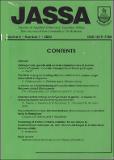| dc.contributor.author | Dube, Z. | |
| dc.contributor.author | Ndhlovu, LR | |
| dc.contributor.author | Muchenje, V. | |
| dc.coverage.spatial | Zimbabwe. | en |
| dc.date.accessioned | 2016-03-09T15:18:36Z | |
| dc.date.available | 2016-03-09T15:18:36Z | |
| dc.date.issued | 2000 | |
| dc.identifier.citation | Dube, Z, Ndhlovu, L.R. and Muchenje,V. (2000) The potential of single-hitched donkeys (Equus asinus) in cultivation tasks in Zimbabwe, Journal of Applied Science in Southern Africa, vol. 6, no.1, pp.45-55. Harare: UZ Publications. | en |
| dc.identifier.issn | 1019-7788 | |
| dc.identifier.uri | https://opendocs.ids.ac.uk/opendocs/handle/20.500.12413/9957 | |
| dc.description | A journal study on the use and importance of single-hitched donkeys to the draught power of Zimbabwe's rural farmers. | en |
| dc.description.abstract | This study was conducted at Matopos Research Station (Zimbabwe) during the 1995/96 summer cropping season to investigate the effect of soil type, animal sex and live weight of single-hitched donkeys in cultivation tasks. Twenty-four donkeys comprising males and females, equally represented in heavy (>130kg) and light (<130kg) weight groups were used in the study. Linear body measurements, work output and physiological parameters were measured from single-hitched donkeys. Soil type significantly affected working distance (P<0.01) and working speed (P<0.001), but had no significant effect (P>0.05) on total work done. Sex had no significant effect (P>0.05) on work output. Live weight significantly (P<0.001) influenced working distance, draught force, elapsed working time and total work done. The single-hitched donkeys worked for a maximum period of twenty minutes per session. Linear body measurements were good predictors (R2=0.41, P<0.001) of work output. Rectal body temperatures changed from pre-work resting values of 37.6 + 0.01 °C to 39.3 + 0.07 C at work stoppage. Heart rates also changed from pre-work resting levels of 54.2 + 2.53 to 118.7 + 3.45 beats per minute at work stoppage. These changes were associated with the refusal by the animals to continue working. There was no significant (P>0.05) effect of sex and live weight on heart rate and rectal temperature changes during the post-work recovery period. Only resting time significantly (P<0.001) affected changes in the studied physiological parameters during the recovery period. The results highlighted the importance of live weight in influencing work performance draof single-hitched donkeys in cultivation tasks. Heavy donkeys of either sex are more useful than light donkeys for cultivation purposes on heavy and light soils. Live weight is more useful than other linear body measurements as a predictor of work output in cultivation tasks by single-hitched donkeys. Work-related physiological changes limit the work capacity of single working donkeys in cultivation, hence adequate rest pauses are necessary | en |
| dc.language.iso | en | en |
| dc.publisher | University of Zimbabwe (UZ) Publications. | en |
| dc.rights.uri | http://creativecommons.org/licenses/by-nc-nd/3.0/ | en |
| dc.subject | Agriculture | en |
| dc.subject | Rural Development | en |
| dc.subject | Science and Society | en |
| dc.title | The potential of single-hitched donkeys (Equus asinus) in cultivation tasks in Zimbabwe | en |
| dc.type | Article | en |
| dc.rights.holder | University of Zimbabwe (UZ) | en |


